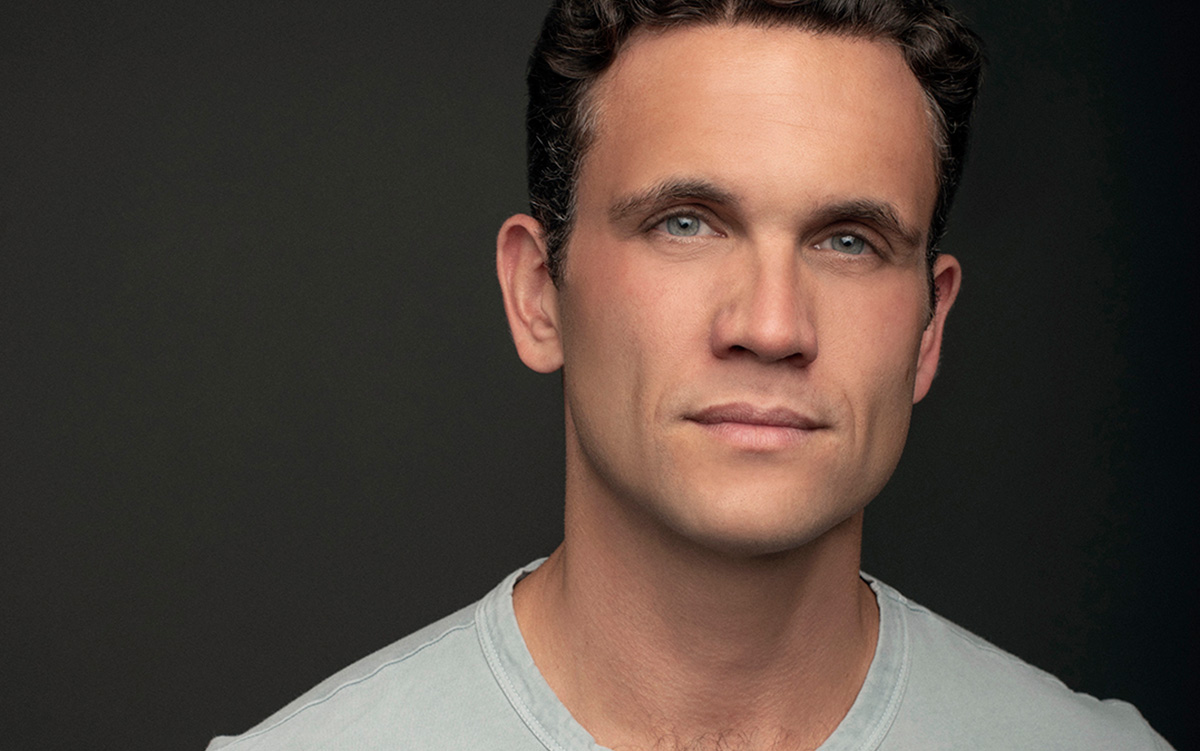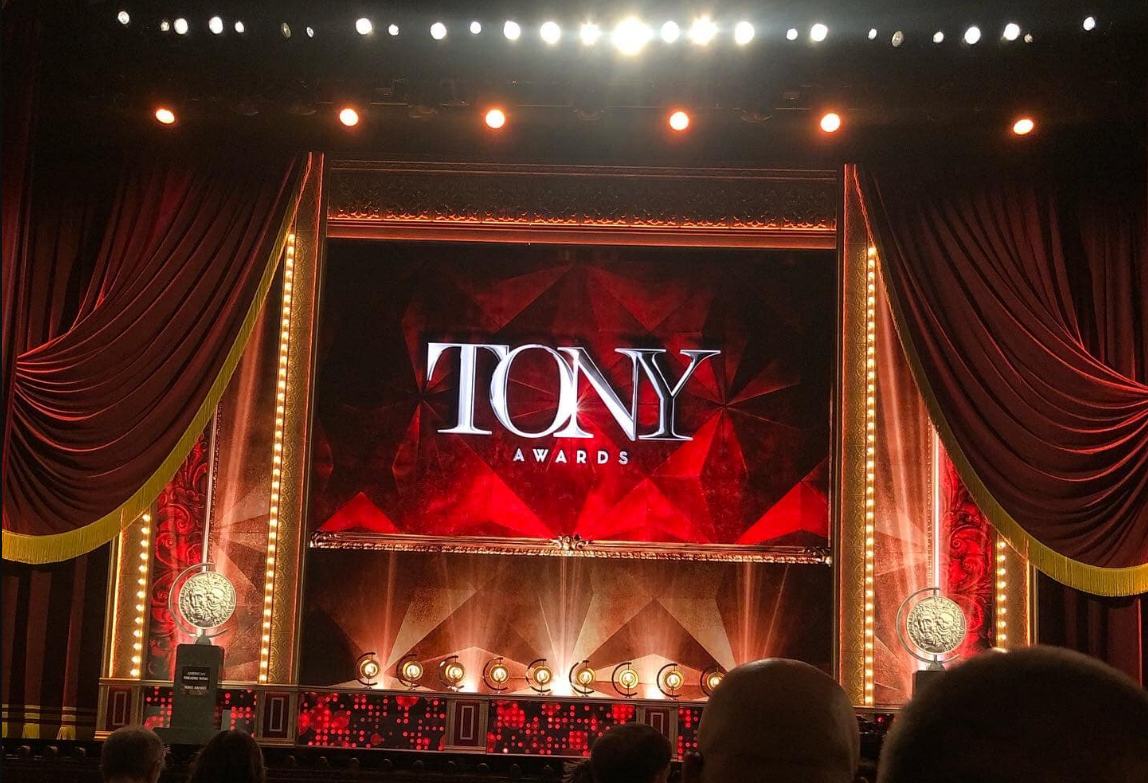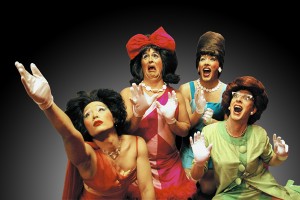Theater
Sicks in the city
Drag troupe brings outrageous holiday show to JCC
Ben Schatz
‘Oy Vey in a Manger’
Through Jan. 2
1529 16th Street, NW
$15-$60
Looking for a holiday show devoid of dancing toy soldiers and that miserly old Englishman? You’re in luck. The Kinsey Sicks have brought “Oy Vey in a Manger” to Theatre J.
Known for their irreverent wit, over-the-top drag and outrageous musical parodies (beautifully sung “dragapella,” and not lip-synched), the ladies have set their sites on the season with devilish takes on old favorites like “Oh Hoey Night,” “Jingle Bells, Don’t Ask Don’t Tell,” “The Twelve Steps of Christmas” and “Crystal Time in the City.”
Ben Schatz, who performs with the group as Rachel and writes the lion’s share of the Sicks’ songs, explains that while the show, whose plot turns on the plight of four drag queens facing foreclosure on their manger/home, has been around for a few years, “this time it’s different – this time, it’s good.” He jests, but in truth the group has reworked some dialogue and added to the sometimes politically charged score.
As a Harvard undergrad in the late ‘70s, Boston-born Schatz was heavily involved in both theater and gay activism (“And now and again could even be found in class.”). He went on to Harvard Law School and after graduating, started the first national AIDS legal program. Later he served as executive director of the Gay and Lesbian Medical Association (GLMA) and was appointed to President Clinton’s Advisory Council on HIV/AIDS.
In many ways, Schatz’s drag persona is a reaction to his prior work experience: “She’s bad, bad, bad, but if you asked her she’d say ‘I’m gorgeous and tasteful and if you disagree then kiss my ass.’ There’s always been a little Rachel in me, but when I was employed as a respectable homo, I had to keep my mouth shut.”
During those buttoned down years, Shatz occasionally donned drag with friends and sallied forth into the night to blow off a little steam and remember who he was. One such outing marks the group’s genesis. Rather famously Schatz and pals attended a Bette Midler concert in drag.
“We were the only drag queens there besides Bette,” he says. “We got a lot of attention and were even approached by a promoter who wanted us to sing at a party. Inspired by the show, we stayed up all night singing and discussing the possibilities of forming a group.”
Soon after, the newly formed Kinsey Sicks (a play of words on “Kinsey 6,” the end of the Kinsey Sexuality Rating Scale defined as exclusively homosexual) made their debut on a street corner in the Castro, San Francisco’s gayborhood.
“We were shocked to make $37. Over 15 years later we’re still working and we ask for at least twice that,” Schatz says.
Comprised of four stock drag characters — raunchy Rachel, controlling Winnie (Irwin Keller), dim Trampolina (Jeff Manabat), and gold-digging Trixie (Spencer Brown) — the Kinsey Sicks boast a loyal and diverse fan base. Co-founders Schatz and Keller have been with the group since its inception in 1993 while an infrequently changing roster of actors have taken on the other roles.
“When a new performer takes over a part, we encourage them to find their own version,” he says. “We like everyone to put his own print on the character.”
Harvard lawyer to presidential appointee to nonprofit executive director to singing drag queen: By most accounts, that’s a pretty kooky career trajectory, but according to Schatz it’s not nearly as extreme as it might sound. For several years, he was both working his day job and playing dates with the group.
In fact, while Schatz was still Medical Association’s director, the Sicks performed at one of the association’s events.
“I was terrified,” he says. “Our show is really quite naughty — particularly my character — and I had no idea what the response from my colleagues would be. Well, they loved it and for me that was very liberating. I suddenly realized that my work as a performer was just as important as anything else I’d ever done. It struck me that I could reach more people using humor and music than I ever could through a speech.”
“If you’d told me when I graduated from Harvard that I’d be singing professionally in drag and living in Mexico I would have thought you were completely out of your mind,” Schatz says. “I’ve managed to surprise myself and that’s a great accomplishment in life.”
Theater
Stephen Mark Lukas makes sublime turn in ‘Funny Girl’
Updated take at Kennedy Center features fabulous score

‘Funny Girl’
Through July 14
The Kennedy Center
$49-$189
Kennedy-center.org
With his striking good looks and sublime singing voice, out actor Stephen Mark Lucas is the ideal musical theater leading man, a title he both nails and thoroughly enjoys.
He’s played Elder Price in “The Book of Mormon” both on Broadway and on tour, and regionally, he’s wowed audiences performing classic parts like Sky Masterson in “Guys and Dolls,” Joe Hardy in “Damn Yankees,” Lancelot in “Camelot,” and Curly in “Oklahoma.”
He’s now playing Nick Arnstein, the love interest of Katerina McCrimmon’s Fanny Brice in the national tour of the Broadway revival of “Funny Girl.” Composed by Jule Styne and Bob Merrill, it’s the musical story of comedian Brice’s rise from anonymity to stardom via vaudeville, Ziegfeld Follies, radio, and some film. While cementing the Brice legend, the show also became inextricably linked to Barbra Streisand through the 1964 Broadway hit and later movie musical that made her a star.
When we meet Arnstein, a suave, mustachioed gambler, he seems on top of the world, but that soon proves otherwise. Lukas says, “He serves as a bit of an antagonist, but his shortcomings are what pave the way for Fanny’s triumphant ending.”
Certainly, the show still features fabulous tuneful hits like “Don’t Rain On My Parade,” “I’m the Greatest Star,” and “People.” But now there’s an updated book from Harvey Fierstein based on the original classic by Isobel Lennart, which strives to make Arnstein a little more likeable, he says.
Lukas, who understudied Ramin Karimloo as Nick while on Broadway before taking the part on tour, says, “My character exists in relation to Fanny. The musical is her memories. So, the way I do the role has a lot to do with the actor who’s playing Fanny. So far there have been six including the well-received Lea Michele.”
The quality of Fanny’s ambition is stronger in the first act while the second act spotlights the demise of her romantic life with Nick, something audiences don’t always anticipate, says Lukas.
He says McCrimmon captures the blind ambition of the younger Fanny, adding, “her voice is out of this world. People aren’t prepared for what she brings to the part vocally. She’s young yet possesses an old Hollywood quality, and she gets the humor of the role. My favorite song is a duet added to the second act. It’s really beautiful.”
Lukas says he’s never had a problem playing straight romantic characters, explaining that his acting takes care of that.
He has noticed that over the years the business has changed from more of a “don’t ask don’t tell” policy to something freer: “When I started in the profession, it was a different time. The public perception of queerness for actors has changed.”
For instance, Lukas is very open about his longtime relationship with former Broadway dancer Brian Letendre – the pair are slated to tie the knot after the “Funny Girl” tour ends.
Most of his roles have dealt with masculinity in some way, says Lukas. “A lot of characters I play start with confidence and unravel as the show goes on. What does it mean to be a man? What is masculinity? What does it mean to be a husband and a father?”
Growing up in Kennebunkport, Maine, he enjoyed annual visits to New York to see Broadway shows. He boarded at the prestigious Phillips Exeter Academy in New Hampshire, and studied theater at NYU. He’s remained based in New York City thereafter.
His life on the road is enjoyable yet disciplined. Lukas says, “the spaces where we perform are interesting for this show in particular. ‘Funny Girl’ is in many ways a show about theater, and we play some of the old vaudeville theaters and movie palaces where Fanny Brice in fact performed.”
While moving from town to town, Lukas takes care of his voice. He makes sure to eat and sleep well, and works out regularly as evidenced by his impressive build. He also prioritizes visits with his partner whenever possible.
“These older book musicals are character driven and have great scores,” says Lukas. “It’s what makes them relevant today. On the surface they might feel dated, but there’s also the contemporary humor and romance.”
What’s more, the work is never stagnant, he adds.
“Increasingly, I approach the work as an actor first and that’s what informs the singing; it’s that intersection that goes from scene into song, and that makes a difference.”
Theater
Sophie Zmorrod embracing life on the road in ‘Kite Runner’
First national tour comes to Eisenhower Theater on June 25

‘The Kite Runner’
June 25 – 30
The Kennedy Center
$39-$149
Kennedy-center.org
Newly single, Sophie Zmorrod is enjoying life on the road in the first national tour of “The Kite Runner,” Matthew Spangler’s play with music based on Khaled Hosseini’s gripping novel about damaged relationships and longed for redemption.
“It’s a wonderful time for me,” says Zmorrod. “I’m past the breakup pain and feeling empowered to explore new cities. A lot of us in the cast are queer, so we figure out the scene wherever the show goes.”
What’s more, the New York-based actor has fallen in love with the work. “I love how the play’s central character Amir is flawed. He is our antihero. He has faults. As a privileged boy in Kabul, he bears witness to his best friend’s assault and doesn’t intervene. He lives with that guilt for decades and gets that redemption in the end.”
“He does what he can to right wrongs. For me who’s regretted things, and wished I could go back in time, it resonates. Watching someone forgive themselves and do the right thing is beautiful.”
Via phone from Chicago (the tour’s stop before moving on to Kennedy Center Eisenhower Theater on June 25), Zmorrod, whose background is Lebanese, happily chats about sexuality, ethnicity, and acting.
WASHINGTON BLADE: Looking at your resume, I see you’ve been cast in roles traditionally played by men. And have you played queer characters?
SOPHIE ZMORROD: Oh yes, both. Whether or not they’re written on the page as queer, they sometimes turn out that way. And that holds true for this show too.
With “The Winter’s Tale” at Trinity Rep, I played Leontes — the king who banishes his wife — as a woman. So, in that production it was about two women and touched on the violence that women sometimes inflict on other women.
And there was Beadle Bamford in Sondheim’s “Sweeney Todd” also at Trinity Rep; I played him as a woman who was masculine and wore a suit. It was a great opportunity to explore myself and gender expression. That was a really good experience.
BLADE: Are you an actor who’s often be called in for queer roles?
ZMORROD: Not really. I’m what you might call straight passing. Sometimes I’ve had to advocate for my queerness. To be a part of something.
Similarly with my ethnicity. I’m called in to audition for the white and Arab roles. It gets tricky because I’m not the exactly the white girl next door and I’m not exactly Jasmine from Disney’s “Aladdin” either.
This is one of the reasons, I really want people to come see “The Kite Runner,” Audiences need to experience the reality of the wide diversity of Middle Eastern people on the stage. We’re all very different.
And not incidentally, from this 14-person cast, I’ve met some great people to add to those I know from the Middle Eastern affinity spaces and groups I’m connected to in New York.
BLADE: In “The Kite Runner” what parts do you play?
ZMORROD: Three characters. All women, I think. In the first act, I’m an elderly eccentric pomegranate seller in the Afghan market, waddling around, speaking in Dari [the lingua franca of Afghanistan]; and the second act, I’m young hip and sell records in a San Francisco market; and at the end, I’m a buttoned-down American immigration bureaucrat advising Amir about adoption.
BLADE: Your training is impressive: BA cum laude in music from Columbia University, an MFA in acting from Brown University/Trinity Repertory Company, and you’re also accomplished in opera and playwrighting, to name a few things. Does “The Kite Runner” allow you to flex your many muscles?
ZMORROD: Very much. Playing multiple roles is always fun for an actor – we like malleability. Also, there are instruments on stage. I like working with the singing bowl; it’s usually used in yoga as a soothing sound, but here we save it for the dramatic, uncomfortable moments. I also sing from offstage.
We are creating the world of the play on a very minimal set. Oh, and we do kite flying. So yeah, lots of challenges. It’s great.
BLADE: It sounds like you’re in a good place both professionally and personally.
ZMORROD: It’s taken a long time to feel comfortable. But I’m on the journey and excited to be where I am, and who I am.

It was a banner night for queer theater artists at the 77th annual Tony Awards, honoring the best in Broadway theater at the Lincoln Center in New York on Sunday. Some of the biggest honors of the night went to the revival of the Stephen Sondheim musical “Merrily We Roll Along” and the dance-musical based on Sufjan Stephens’ album “Illinoise.“
“Merrily We Roll Along,” which follows three friends as their lives change over the course of 20 years, told in reverse chronological order, picked up the awards for Best Revival of a Musical and Best Orchestrations.
Out actor Jonathan Groff picked up his first Tony Award for his leading role as Franklin Shepard in the show, while his costar Daniel Radcliffe earned his first Tony Award for featured performance as Charley Kringas.
Groff gave a heartfelt and teary acceptance speech about how he used to watch the Tony Awards as a child in Lancaster County, Pa.
“Thank you for letting me dress up like Mary Poppins when I was three,” he said to his parents in the audience. “Even if they didn’t understand me, my family knew the life-saving power of fanning the flame of a young person’s passions without judgment.”
Groff also thanked the everyone in the production of “Spring Awakening,” where he made his Broadway debut in 2006, for inspiring him to come out at the age of 23.
“To actually be able to be a part of making theatre in this city, and just as much to be able to watch the work of this incredible community has been the greatest pleasure of my life,” he said.
This was Groff’s third Tony nomination, having been previously nominated for his leading role in “Spring Awakening” and for his featured performance as King George III in “Hamilton.”
Radcliffe, who is best known for starring in the “Harry Potter” series of movies, has long been an ally of the LGBTQ community, and has recently been known to spar with “Harry Potter” creator JK Rowling over her extreme opposition to trans rights on social media and in interviews. It was Radcliffe’s first Tony nomination and win.
Lesbian icon Sarah Paulson won her first Tony Award for her starring role in the play “Appropriate,” about a family coming to terms with the legacy of their slave-owning ancestors as they attempt to sell their late father’s estate. It was her first nomination and win.
In her acceptance speech, she thanked her partner Holland Taylor “for loving me.” Along with Paulson’s Emmy win for “American Crime Story: The People vs. O.J. Simpson,” she is halfway to EGOT status.
The Sufjan Stephens dance-musical “Illinoise,” based on his album of the same name, took home the award for Best Choreography for choreographer Justin Peck. It was his second win.
During the ceremony, the cast of “Illinoise” performed “The Predatory Wasp of the Palisades is Out to Get Us!”, a moving dance number about a queer romance.
A big winner of the night was the adaptation of the S.E. Hinton novel “The Outsiders,” which dominated the musical categories, earning Best Director, Sound Design, Lighting Design, and Best Musical, which earned LGBTQ ally Angelina Jolie her first Tony Award.
Also a big winner was “Stereophonic,” which dominated the play categories, winning the awards for Best Play, Featured Actor, Director, Sound Design, and Scenic Design.
“Suffs,” a musical about the fight for women’s suffrage in the U.S., which acknowledges the lesbian relationship that suffragist Carrie Chapman Catt had in song called “If We Were Married,” took home awards for Best Book of a Musical and Best Score, both for creator Shaina Taub.
Had “Suffs” also won for Best Musical, producers Hilary Clinton and Malala Yousafzai would have won their first Tony Awards.
Other winners include Maleah Joi Moon for her lead role and Kecia Lewis for her featured role in the Alicia Keys musical “Hell’s Kitchen,” Jeremy Strong for his lead role in An Enemy of the People, and Kara Young for her featured role in “Purlie Victorious: A Non-Confederate Romp Through the Cotton Patch.”
-

 Canada2 days ago
Canada2 days agoToronto Pride parade cancelled after pro-Palestinian protesters disrupt it
-

 Baltimore5 days ago
Baltimore5 days agoDespite record crowds, Baltimore Pride’s LGBTQ critics say organizers dropped the ball
-

 Sports5 days ago
Sports5 days agoHaters troll official Olympics Instagram for celebrating gay athlete and boyfriend
-

 Politics1 day ago
Politics1 day agoHRC slams White House over position opposing gender affirming surgeries for minors






